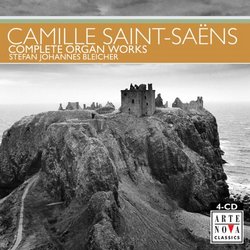| All Artists: Camille Saint-Saens, Stefan Johannes Bleicher Title: Camille Saint-Saëns: Complete Organ Works Members Wishing: 0 Total Copies: 0 Label: Arte Nova Classics Original Release Date: 1/1/2006 Re-Release Date: 4/11/2006 Genres: Special Interest, Classical Styles: Wedding Music, Marches, Chamber Music, Forms & Genres, Concertos, Fantasies, Historical Periods, Classical (c.1770-1830) Number of Discs: 4 SwapaCD Credits: 4 Other Editions: Famous Organ Works UPC: 723721204259 |
Search - Camille Saint-Saens, Stefan Johannes Bleicher :: Camille Saint-Saëns: Complete Organ Works
 | Camille Saint-Saens, Stefan Johannes Bleicher Camille Saint-Saëns: Complete Organ Works Genres: Special Interest, Classical
The remarkable organ works of Camille Saint-Saëns (1835?1921) were long neglected as being rather too classical compared to the prevailing taste for French organ romanticism. The utmost clarity of the voices, the ele... more » |
Larger Image |
CD Details
Synopsis
Album Description
The remarkable organ works of Camille Saint-Saëns (1835?1921) were long neglected as being rather too classical compared to the prevailing taste for French organ romanticism. The utmost clarity of the voices, the elegance and natural melody ? as well as the research of form perfection ? are characteristic of his work and confer to his compositions for organ a refinement of great subtlety. As a result of his successful concert performances, radio & television productions and more than 30 CD recordings (all of which have been well received), Stefan Johannes Bleicher (b. 1962) is considered one of the leading organ soloists of his generation. Bleicher studied concert organ with Lionel Rogg in Geneva and Ewald Kooiman in Amsterdam. He also studied historical performance practice with Nikolaus Harnoncourt at the Mozarteum in Salzburg.

 Track Listings (10) - Disc #1
Track Listings (10) - Disc #1